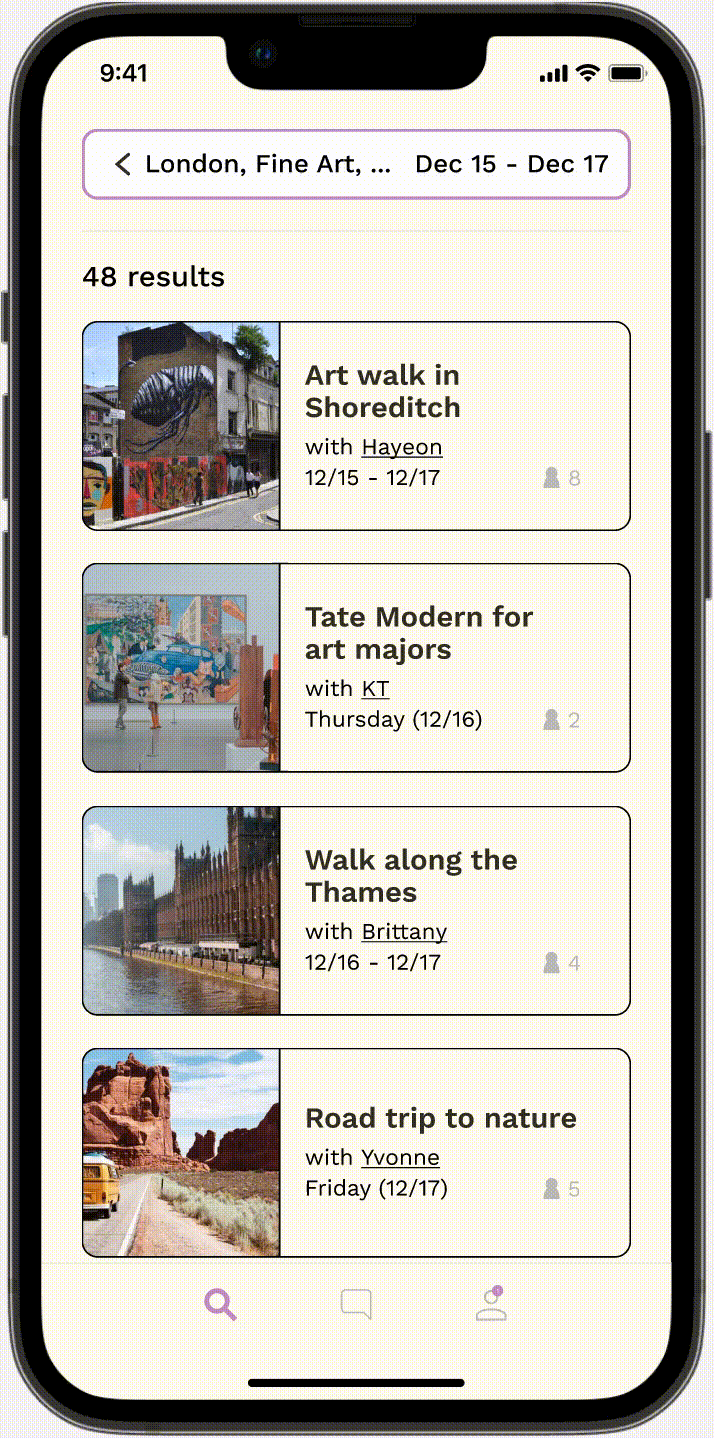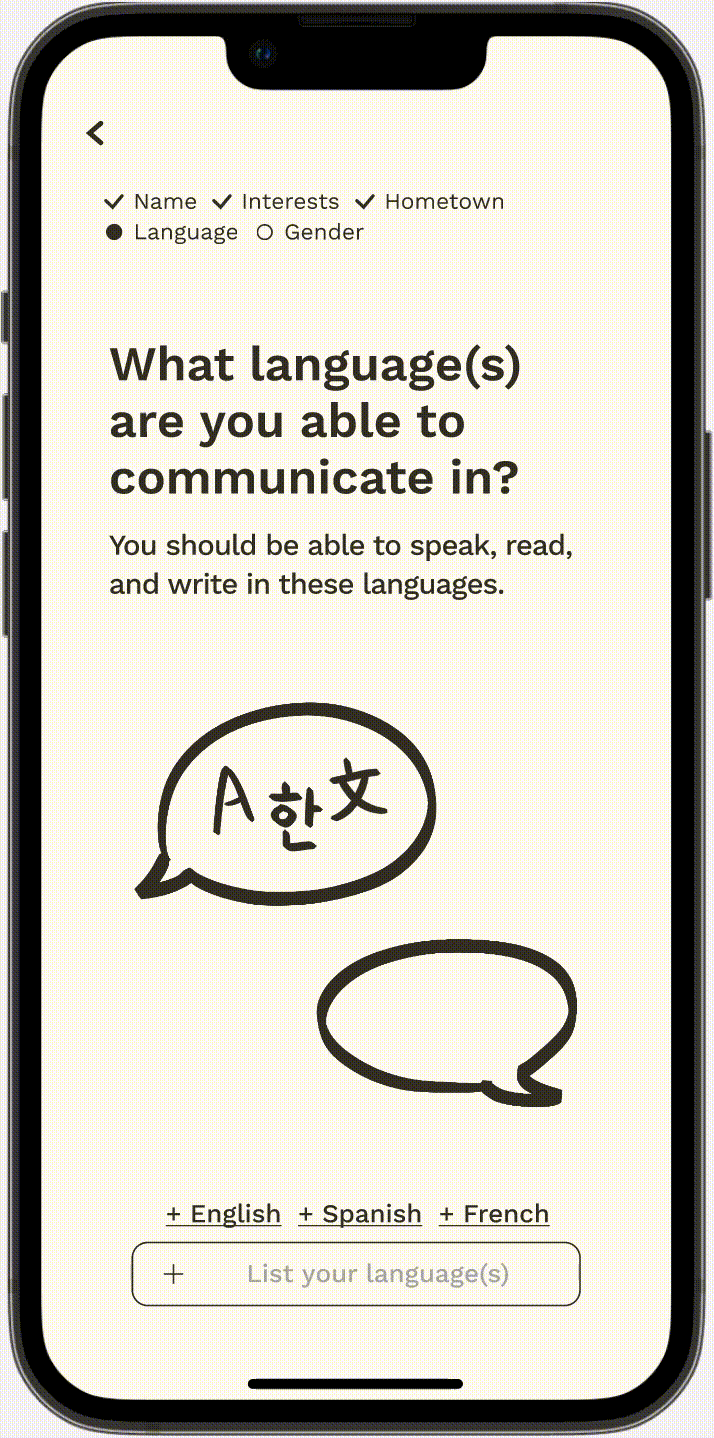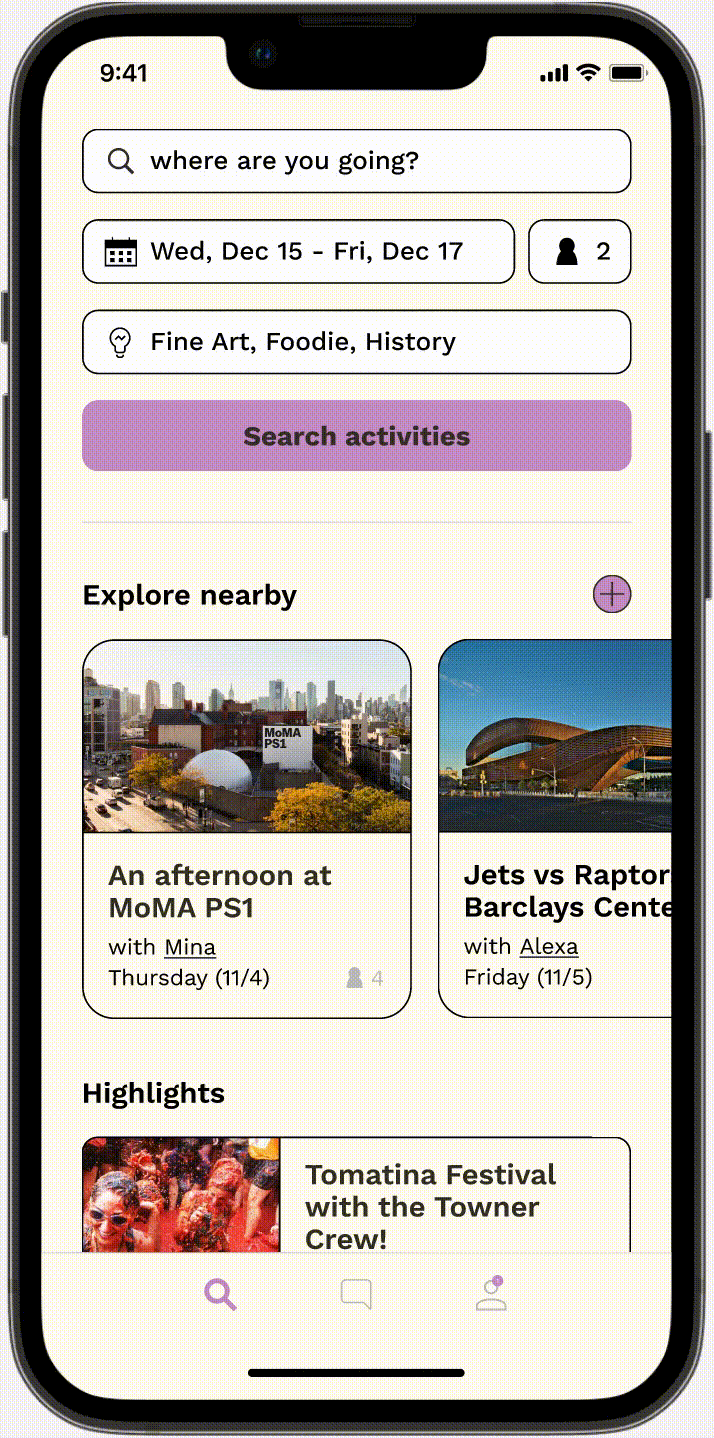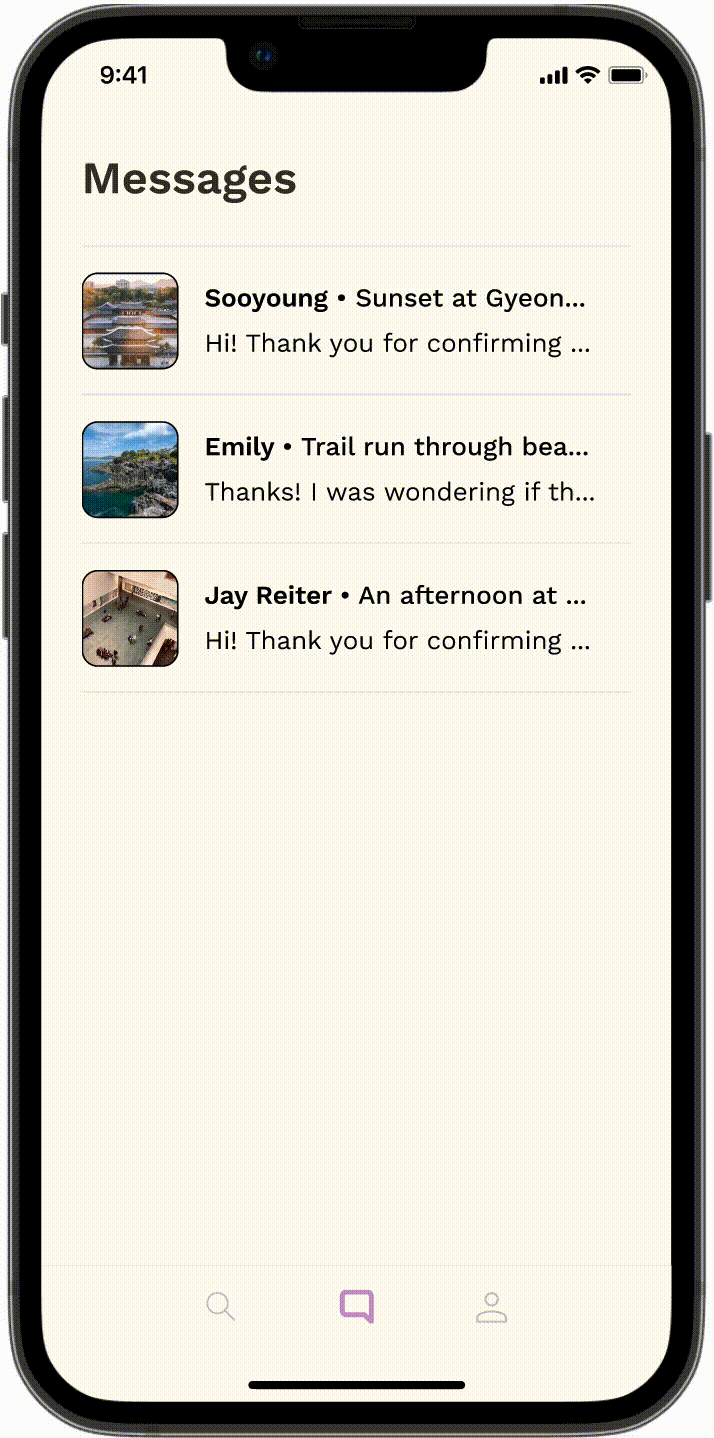Me...Jane
Me...Jane
Marketing design for musical theatre
Marketing design for musical theatre
Towner: travel slower, with locals
Project for
Class project
@ Parsons School of Design
Timeline
October – November 2021
My role
UX design:
research, ideation, content design, visual design,
prototyping

Culturally conscious & sustainable travel happens with locals' input & guidance.
Tourism is becoming increasingly unsustainable. Carbon emissions from air travel and waste generated from using disposable products are widely known causes of it. What's often overlooked when it comes to unsustainable travel, however, is the strain put on local residents and culture due to tourists' culturally insensitive behaviors and over-tourism.
To address these issues through local input, we created a platform that links visitors to locals based on their interests. Local residents to host travelers on activities related to their expertise. Travelers, in turn, can avoid overcrowded tourist hotspots and instead participate in diversified, interest-based activities that better reflect local culture.
Our solution
Learning that the input from locals is essential in mitigating the damages of overtourism as well as culturally insensitive tourism, we designed an app that matches locals and tourists based on activities of interest, and in turn fosters relationships based on shared interests that benefits both the travelers and locals alike.
Locals and travelers are matched based on their interests
Thorough yet engaging onboarding & profile-building process ensures interest-based matches that benefit both the hosts & travelers

Users select 3 interests and elaborate on each area as part of their "bio."
Hosts/travelers can get a quick glimpse of other Towners' interests before deciding on doing an activity together.
Locals list an activity based on their interest & expertise.
After listing an activity of their choice, hosts can review the travelers’ profile before accepting, making it a two-way exchange between locals & travelers

Travelers choose activities listed by locals
Travelers can filter activities based on fields like date range, party size, and interests

Traveler can review activity details as well as the host's bio & information before sending their interest.
Curious how our solution contributes to sustainable travel? Let's begin with what we started with!
Design brief
How might we address problems that inhibit the tourism industry from adapting sustainable practices?
Research
The design brief first and foremost called for an understanding of "sustainability" in the travel industry. What was sustainable tourism? Our preliminary research revealed that sustainability in tourism entailed way more than zero-waste:
-
Environmental sustainability: restoring the damages of tourism
-
Environmental regenerability: restoring then further improving a lasting natural system
-
Cultural sustainability: culture & heritage are preserved, rather than expended/damaged
-
Sustainable habitability: keeping the place livable for the residents
Although the greater attention is on environmental sustainability, our research revealed that the strain tourism, which prioritizes the tourists' enjoyment over the residents' wellbeing, causes on the local culture and community also results in irreparable damages that makes it unsustainable.
“Tourism had become extractive and hurtful,
with tourists coming here and taking, taking, taking, taking,
without any reciprocation with locals.”
– Lindsey Ozawa, farmer and chef in He’eia on Oahu Source: NYT
To learn more about the state of tourism, we conducted interviews with two industry experts and conducted a survey with 53 participants.
Subject Matter Expert Interviews
Q: What makes modern tourism unsustainable?
Our experts with decades of experience in ecotourism and sustainable trip design outlined two main reasons for what makes modern tourism unsustainable.
1. Over-tourism
Tourism in the midst of crowds inevitably detracts travelers from respect or appreciation. Overtourism in overcrowded "hotspot" tourist destinations results in a culture of consuming culture, byproducts of which are damages & vandalization of cultural artifacts as well as local residents' lifestyle & habitats.

There's a problem with capacity management; the perpetual cycle that draws in capital, which in turn draws more infrastructures that will accommodate more people and capital, largely contributes to overtourism.
2. Cultural insensitivity
Locals are consistently exposed to tourists’ ignorant behaviors. In places where there is a power dynamic disparity between Western tourists and indigenous residents, locals are almost forced to curry favor with the tourists to make a living.
Similar to overtourism, a “structure that enables irresponsibility” is also to be blamed for.
Q: How do we solve these issues?
1. Over-tourism
To break the cycle that maintains hotspots over-traveled, our experts pointed to
1. Marketing alternative destinations & activities
2. Working with the community, the tourism department, and other key players to decide on the alternative destinations
2. Cultural insensitivity
Education & local input are key. Local input should be an integral part of guiding or designing any trips, especially when it comes to reducing unintended ignorance or insensitive behaviors.
“A lot of times, the impact comes
from people not knowing. ...
How can we provide the resources
that are more easily accessible?”
“By far in the way, having a local
[guide the trip] is essential. ... There’s just so much more value added when you have someone who knows the place intimately.”
Survey highlights
53 participants, 47% of which were 18-22, answered questions about their travel preferences and behavioral changes when traveling with locals. Here are the key insights:
A majority of travelers prefer slow travel.
With one week to travel, would you rather stay
in one city or travel to as many cities as possible?
I'd rather get to know
one city better
I'd rather visit
as many cities
as possible
Slow travel is a travel trend that directly contrasts with the fast-paced consumption of travel. Traveling slowly and connecting to local culture is meaningful to young travelers.
Respect for local culture matters to travelers.
As a traveler, how much does fellow travelers' respect for local culture matter to you?

1: It doesn't matter too much as long as
they're not causing explicit harm
5: Travelers without respect for local culture
shouldn't be traveling
Traveling with locals makes a difference.
When traveling with a local,
My behavior
is the same
I see my behavior change
About half of the respondents reported that they see their behavior or attitude change when traveling with locals. The benefits of traveling with locals they listed are:
-
Navigating language barriers
-
Being introduced to "localized experience of the location, away from tourists."
-
Navigating cultural barriers
“[Locals] are knowledgeable and help me with any cultural barriers and also help me stay aware of if I’m doing something that’s not respectful to the culture."
“They introduced me the non-tourist spot that’s known only to the local. Usually,
it is much less crowded and accurately capture the local culture and atmosphere."
Research summary
1. Think economy of meaning
"Quality over quantity" is a key principle for regenerative tourism. Instead of focusing on directionless growth (ie. number of visitors, revenue generated, etc), sustainable solutions should focus on preserving and improving the holistic well-being of the country.
2. Focus on the local community
The needs of the local community has long been neglected in favor of those of tourists.
Regenerative tourism places community identity and morale as a key pillar in attaining sustainability.
3. Diversify options by leveraging diverse interests
A Belgian tourism organization, VisitFlanders, used local input to reposition its stance to economy of meaning and began initiatives like "linking visitors with locals who share their passions for things like history or food and making storytelling central to sites like its World War I battlefields."
This approach engages the local community in key decision making stages, and reshapes tourism from being an activity that tourists disproportionately benefit from, to something both locals and visitors can enjoy together.
Problem statement
Based on the research insights, we defined the problem statement to address both
over-tourism and cultural insensitivity, the key problems that makes the tourism industry unsustainable and exploitive of the local habitat.
How might we reduce the overcrowding of tourist attractions and prevent culturally irresponsible travel?
Project direction
I wanted to create a solution that would
1. Reduce over-tourism through diffusion into
other activities
Generating more activities for tourists and diversifying options for their itinerary would
help reduce over-tourism at tourist hotspots and generate alternative revenue sources
that actually benefits the local economy.
2. Take input from local residents
Deciding on the alternate activities without input from local resident can result in the
same kinds of damages to the local culture and community that over-tourism causes.
“We’ve managed to shift the thinking from having [the locals']
primary objective be about growing the numbers, to creating flourishing destinations, flourishing communities and having
them say what kind of tourism they want."
– Anna Pollock, the founder of Conscious Travel Source: NYT
Prototype
To meet both of these objectives, I came up with the idea of creating a platform that links visitors to locals based on their interests. The app would enable local residents to host travelers on activities related to their interests and/or expertise, and travelers to pick and choose from those activities based on their interest.
User flow

Flow #0
Launch app


Flow #1
Sign up

Users select 3 interests and elaborate on each area as part of their "bio." Hosts/travelers can get a quick glimpse of other Towners' interests before deciding on doing an activity together.

Locals leading activities for travelers may still sound like a one-sided service that exploits locals. Towner provides opportunity for cultural and language exchange that locals can also benefit from.
Flow #2
Explore & search
activities

Travelers can filter activities based on fields like interests, date range, and party size.
The topics listed are the interests selected during the sign up process, but can easily be swapped on a search by search basis.

Before sending their interest, travelers can review activity details as well as the host's bio & information.
Flow #3
List activity &
review requests
Locals can list an activities based on their interest and/or expertise, diversifying itinerary options for travelers and reducing strain on existing tourist hotspots.

The host review the travelers’ profile before accepting, making it a two-way exchange that is meaningful for both locals & travelers.
Flow #4
Messaging &
managing activities

Given that anyone can be a host and a traveler at the same time, users can manage the activities they are hosting as well as attending on My Page.

Users can arrange meeting details with their matches using the built-in messaging feature.
Next steps
Short term goals
Enhancing the flow & security features
-
Test different match processes: Testing alternatives to the [search -> filter -> send interest] process to optimize the activity search process – ie. travelers swiping on activities
-
Add security features: Incorporating quick access security features users can use when their sessions are taking place to get help in case of emergency
Long term goals
-
Test the key flows in different languages / areas
-
Consider separating the onboarding & use processes for hosts vs. travelers: Towner's default design enables all users to host and participate in activities at any time. However, after monitoring long term use, if the proportion of users who use one service (ie. host only or participate only) is significantly bigger than those who both host and participate, developing one onboarding & use flows for hosts and another for travelers would enable a simpler user flow for our users.